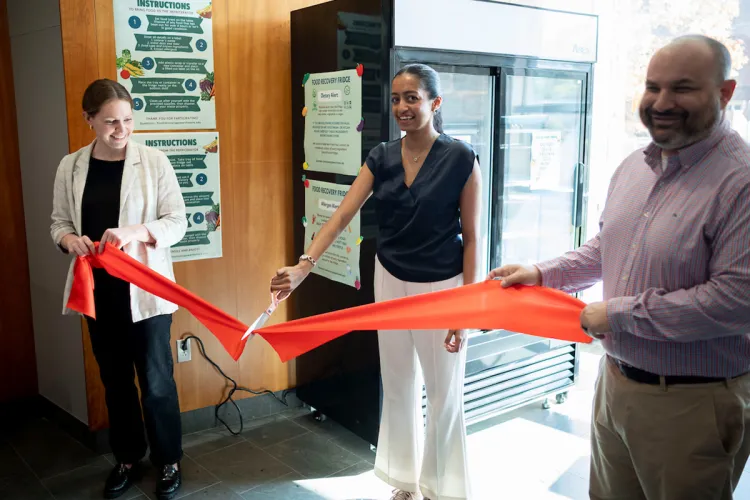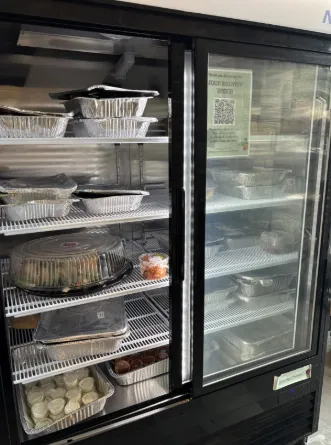Food Recovery Fridge Provides Free, Sustainable Meals

Saumya Raj ’25 (middle) cuts the ribbon for the grand opening of the Food Recovery Fridge, which she helped develop as a President's Sustainability Research Fellow.
A student-led food recovery initiative, the Food Recovery Fridge, completed a successful first year, helping to reduce campus food waste and provide free food to students, faculty, and staff. The Food Recovery Initiative was created by Saumya Raj ’25, a two-year recipient of the President’s Sustainability Research Fellowship (PSRF).
“When I was selected to join the President's Sustainability Research Fellowship, my mentor [Associate Director of Sustainability] Clare Hyre and I set out to address food waste on campus,” says Raj, an economics major with minors in philosophy and engineering from Kerala, India. “After conducting research, we identified food leftovers from campus events as a niche issue — one that seemed logistically complex, but full of potential.”
While the College has long maintained a robust composting program, the Food Recovery Fridge was proposed as the first stop to recover extra food from events and share it with the campus community before composting. Raj and Hyre note that 40% of food produced in the U.S. is wasted, contributing 133 billion pounds of wasted food to landfills daily, and leading to methane emissions. Their initiative, which aims to increase food recovery and decrease environmental harm, aligns with the College’s Zero Waste goals to embed zero waste into campus culture through a series of behavioral, operational, and policy changes; to reduce campus per capita waste 15% by 2030 and 25% by 2035; and to achieve 80% diversion by 2030 and 90% diversion by 2035.
The fridge, located in the Science Center lobby, was unveiled in October and allows for the safe collection and redistribution of unused edible food served at campus events. It is supported by an Amplify Grant from the President's Climate Commitment Fund and made possible through collaborations with Dining Services, the Engineering Department, Facilities Management, the Office of General Counsel, and Events Management. Raj says these cross-campus partnerships enabled this project to contribute meaningfully toward Swarthmore College’s environmental and social goals.
“It’s been incredible for the FLI community; a lot of my friends use it regularly,” says Devin Freeman-Robinson ’25, a first-generation/low-income student representative from Sacramento, Calif.

The initiative, which aims to increase food recovery and decrease environmental harm, aligns with the College’s Zero Waste goals to embed zero waste into campus culture through a series of behavioral, operational, and policy changes.
Along with Raj and Hyre, the initiative’s team includes Dining Services Retail Manager Tim Smith; Green Advisors Addie Franklin ’27 and Yuki Yamada ’27; and student worker liaisons who received ServeSafe training. Event coordinators on campus can request that liaisons pick up their excess event food so that it’s properly transported to the fridge.
“[Raj] has found a creative way to solve a tricky problem: matching students with leftover food,” says Isaiah V. Williamson Professor of Civil and Mechanical Engineering Carr Everbach. “Already, we have saved a great deal of waste from incineration in Chester, and made Swarthmore a more welcoming campus.”
Raj designed a weight sensor to track the amount of food that enters and leaves the fridge each day. Engineering Machinist “J” Johnson worked with her on implementing the sensor design, and Electronics, Instrumentation & Computer Specialist Ed Jaoudi helped Raj order and evaluate the proper equipment. The sensor was installed and calibrated with the help of Ryder Maston ’26, Lindsay Turner ’25, and Everbach.
In October, Hyre was invited to present the Food Recovery Fridge initiative at an Association for the Advancement of Sustainability in Higher Education conference in California, highlighting the innovative project as a scalable solution to food waste management.
Raj is passionate about advancing environmental awareness and creating solutions that make sustainability accessible and engaging. She’s confident that, given the incredible reception from students, faculty, and staff, the fridge will continue to add value to campus and offset campus waste.



